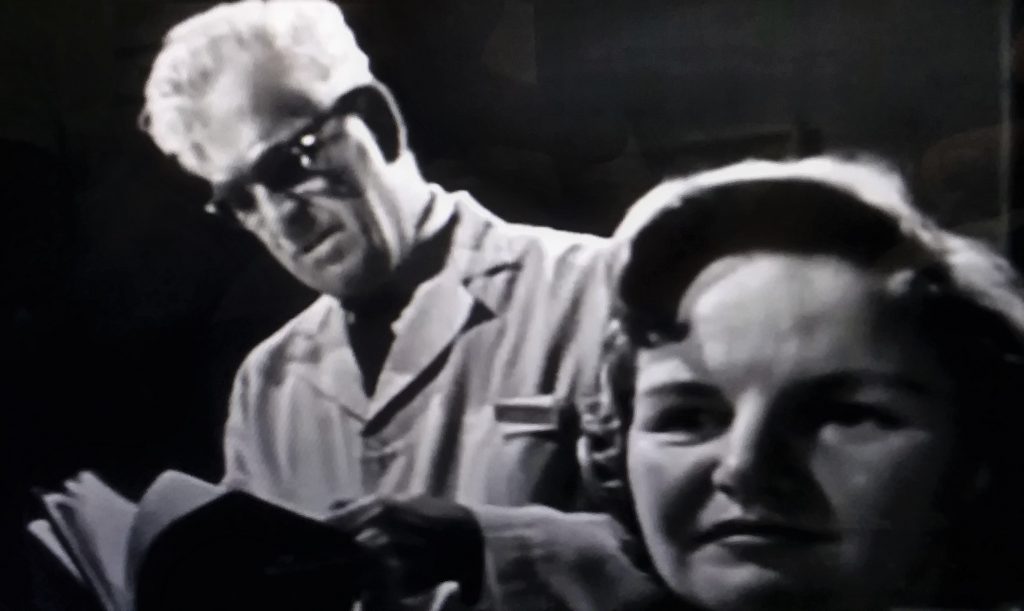
The New-Hollywood stars who tried helping their kids cheat their way into college could have learned a valuable lesson from the ghost of an Old-Hollywood star: Boris Karloff. In one of his lesser known roles for a 50s-era TV anthology series (Studio One), Karloff played a scientist about to receive the Nobel Prize for his research. The episode is titled “Shadow of a Genius.” Everything was great for this genius until he realized the key to his project’s success was due to the work of a now-deceased junior partner. He couldn’t get his mind around the idea that he was an unwitting plagiarist about to receive an honor for which his dead colleague deserved credit. Before notifying the Nobel Committee that he’d have to refuse the award, the deceased colleague’s daughter shows this contrite scientist a message her father included in his research notes, acknowledging the inspirational role his senior partner played in reaching the project’s scientific conclusions. The non-scientific conclusion: The Nobel went to this Senior/Junior collaboration.
This brings to mind an observation many writers have plagiarized:
“Taking things from one source is plagiarism; taking things from several sources is research.”
So, what’s the connection between plagiarism and scripture? Anyone who pays attention to the scripture readings during any Sunday mass will recognize a fair share of similarities among Old and New Testament sources. This Sunday is no exception.
The first reading from Isaiah (IS 5:1-7) tells of the master of a vineyard who invested all of his time and effort cultivating his product, only to be paid back with a crop of wild grapes. For this the master gives up on his beloved project, letting it be destroyed by entropy and drought. Isaiah explains the moral of his story:
The vineyard of the LORD of hosts is the house of Israel, and the people of Judah are his cherished plant; he looked for judgment, but see, bloodshed; for justice, but hark, the outcry!
In the gospel from Matthew (MT 21:33-43), Jesus also tells of the master of a vineyard, who after putting in all the work a good vineyard requires, entrusts its care and productivity to a series of tenants who not only cheat the owner of his produce but eventually kill the son he sent to settle up with them. The lesson Jesus teaches the priests and elders:
“The kingdom of God will be taken away from you and given to a people that will produce its fruit.”
Did Jesus plagiarize Isaiah? It could be argued Isaiah plagiarized Jesus, considering his prophetic gift of foresight. Jesus actually referenced Isaiah’s writings several times during his ministry in a collaboration spanning the centuries to illustrate the chasm between a people and their God.
Another Old Testament prophet, Jeremiah, quotes God as hating how plagiaristic false prophets have abused his teachings (Jeremiah 23:30-32):
Therefore I am against the prophets—oracle of the LORD—those who steal my words from each other. … those who compose their own speeches and call them oracles. … prophets who tell lying dreams … those who lead my people astray by recounting their reckless lies.
The difference between prophetic plagiarism and Godly inspiration? Collaboration.
In Mark (Mark 9:38-39), Jesus helps us understand that distinction when his disciple John reports to him:
“Teacher, we saw someone driving out demons in your name, and we tried to prevent him because he does not follow us.”
Jesus replied, “Do not prevent him. There is no one who performs a mighty deed in my name who can at the same time speak ill of me. For whoever is not against us is for us.”
As we 21st century disciples keep trying to drive out the demons plaguing us with all manner of deadly sins, it wouldn’t hurt to remember the lesson the authors of that old Boris Karloff teleplay could have borrowed from Jesus and the prophets: there’s no plagiarism in partnership.
–Tom Andel